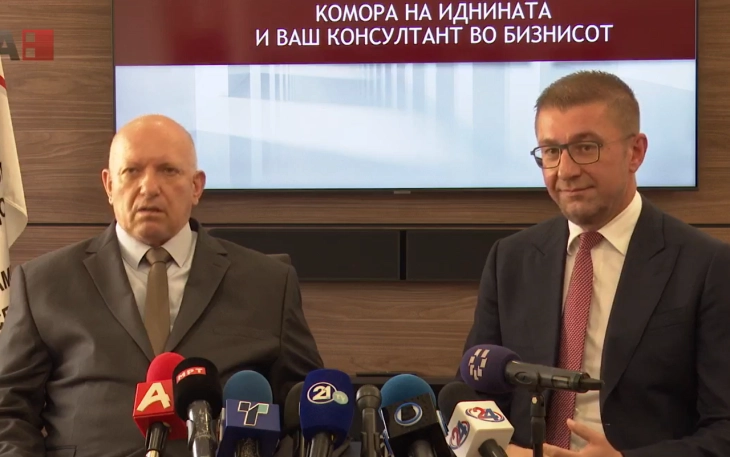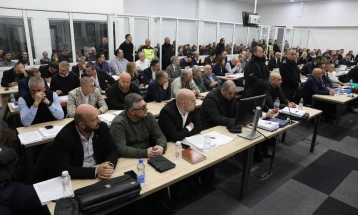Mickoski and Azeski in favor of dialogue with unions over Sunday as non-working day
- Quizzed about the unions' statement on a potential revision of the law establishing Sunday a non-working day, Prime Minister Hristijan Mickoski told media Thursday at an event hosted by the Economic Chamber that the Government is open for dialogue with the unions, but, he said, it must also look after the country’s future.
- Post By Angel Dimoski
- 16:12, 25 July, 2024

Skopje, 25 July 2024 (MIA) - Quizzed about the unions' statement on a potential revision of the law establishing Sunday a non-working day, Prime Minister Hristijan Mickoski told media Thursday at an event hosted by the Economic Chamber that the Government is open for dialogue with the unions, but, he said, it must also look after the country’s future.
“We are at their disposal; we will discuss the issue with the unions etc. But we must look after the country’s future. That’s what is very important, since if we don’t have a healthy economy, we won’t have workers. That’s very important. And when we don’t have workers, the workers will go somewhere else, and this country will empty out. The more the country empties out, the less budget income it will have, which means less money for wages and pensions and capital investments and assistance. It’s a whole system. So, we must organize that system so that it can function perfectly if we want all of us to be happy together,” Mickoski said, adding that a system should be created through dialogue which will function in the future as well.
The President of the Economic Chamber, Branko Azeski, who was also asked about the issue, said it should be discussed and the public notified only after an agreement is reached.
“And I will stick to those principles and will no longer comment. I believe I will have good cooperation with the Federation of Trade Unions and with all unions. And I would like to reiterate, for those that don’t know, the economic chambers are representatives of businesses, and businesses contain both employers and employees. We have never been and we will never be in a conflict with workers, because without them, we can’t function. Macedonia needs dialogue, and we are in favor of dialogue,” Azeski said.
Asked when the funds from the Hungarian loan are expected to be injected into the business sector and how far along the law on the loan is, Mickoski said the Government, at a session Wednesday, tasked the Finance Minister to sign an agreement with her Hungarian counterpart.
“The law on the loan must pass through Parliament, since we are doing this in a transparent procedure. We don’t hide, we won’t smuggle anything through. These are the conditions, that’s the sum. When will it happen? I expect the funds to be available to businesses sometime during the first month of fall, with the remaining EUR 250 million available to the municipalities next year,” Mickoski said.
Photo: MIA







